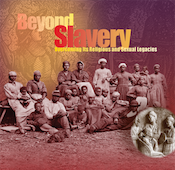Beyond Slavery
Explore the Conference
Explore the Conference by Subject
Slavery in Christian, Jewish, and Muslim Scripture and Religious Law
Christianity, Religion of the Slaveholders and the Enslaved
Sexual Assault and Exploitation Under U.S. Slavery and Jim Crow
How Slavery Has Shaped Our Understandings of Marriage and Friendship
Slavery, Violence, and the State
Beyond Slavery:
Overcoming Its Religious
& Sexual Legacy
Sheila Briggs:
Gender, Slavery, and Technology: The Shaping of the Early Christian Moral Imagination
From where did early Christians get their sexual ethics? The major but often neglected source was their experience of daily life in the Roman Empire. This experience included the all-pervasive institution of slavery and the sexual exploitation it entailed. Both enslaved persons and sexual exploitation were literally on show in the amphitheater, where Christians found themselves caught up in the spectacle both as audience and as victim. Those brutal and often sexual spectacles had a profound effect on the sensibilities of ancient people, including Christians. Their moral imagination was shaped by the amphitheater and what went on inside it, and the amphitheater's influence on their attitudes toward slavery, sexuality and much else long outlasted the Roman Empire. The amphitheater's messages about the character of enslaved people, their sexual availability, their promiscuity, and their criminality still haunt the predominantly Christian society of contemporary America.
This video was recorded on October 15-16, 2006 as part of the conference, "Beyond Slavery: Overcoming Its Religious and Sexual Legacy." It was sponsored by the Feminist Sexual Ethics Project in the Near Eastern and Judaic Studies Department at Brandeis University.
